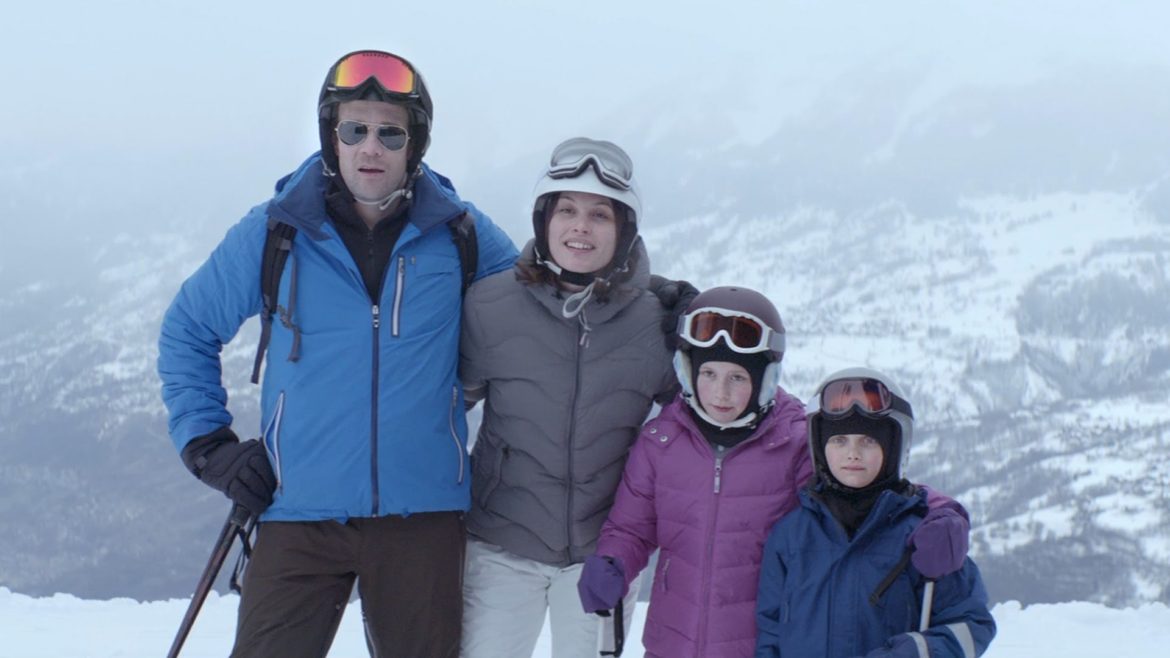The story Force Majeure tells is, on its surface, completely straight-forward, and doesn’t indicate all the tension the film ultimately delivers. It’s an action film where all the fireworks are (mostly) internal and a disaster film that only briefly features any disasters, and even those turn out not to be what they seem. But, in its accomplished plotting, mounting dread, and unexpected flourishes, it’s as riveting as any high-stakes suspense movie. The film is also surprisingly funny, which both undercuts the grimness and throws it into relief.
Tomas (Johannes Kuhnke), his wife Ebba (Lisa Loven Kongsli), and their two kids, Vincent and Clara (real-life siblings Vincent and Clara Wettergren) are vacationing for several days in a ski resort in the Alps. This picture-perfect, uber-bourgeois Swedish family have gathered for some rare undistracted time together as a unit (though Tomas can’t help checking his work cell from time to time). At the start, they banter warmly, have some family photos taken, hit the slopes, dine in style, sleep adorably all four to a bed in matching long-johns, and generally constitute a portrait of familial comfort, ease, and privilege.
Right from the beginning, however, we get the sense there’s trouble brewing. The film opens with cannon blasts and the sudden bursts of edgy strings from Ola Fløttum’s original score (which brings the intensity of György Ligeti to mind). The guns are used, in the film’s world, to trigger “controlled avalanches” on the mountains, so that skiers won’t trigger less controlled ones, and the strings are used, in our world, to immediately put us on alert. If that combo weren’t enough, a title card announces “Ski Day One,” like we’re in The Shining. That can’t be good.
It doesn’t take long for things to turn. While having lunch on an outside patio overlooking the picaresque surroundings, one of those controlled avalanches starts rushing down the mountain. With all the faith implicit in their bourgeois sense of order, the patrons pose and take pictures in front of the approaching snow. After all, the resort’s management knows what they’re doing. But the wall of snow keeps bearing down on them and panic erupts, with people clawing to escape. Ebba shelters the children; Tomas flees, effectively abandoning his family at the most critical moment. This may sound like a spoiler, but it’s truly not. This is where the story begins.
The parents’ two reactions, and their rippling consequences both within and outside the family, are the movie’s real focus. The avalanche is not the “major force” of the title, or at least not the central one. As it turns out, the avalanche stopped well short of the building, and the panic was caused instead by the debris it stirred up. It’s a bitterly funny irony – there was no danger, really. But now, with seeds of doubt and suspicion of character planted, there is.
Ebba is confounded by her husband’s display of cowardice, and then doubly injured when he maintains nothing of the sort happened. In classic man-splaining fashion, he concedes that it may have been her impression that he ran away and left them to die, but it’s not how he remembers it at all – as if everything is merely a matter of perspective. In subsequent scenes, the events are rehashed with mortified strangers at dinner and over drinks. The clash of their “perspectives” – that is, Ebba’s insistence on what actually happened, Tomas’ deflections and equivocations – generates growing hostility and alienation, and leads inexorably to a crisis. And then, in a third-act twist it’s best to experience cold, Östlund complicates their roles yet further. Viewers will have to determine for themselves what the film’s final minutes are getting at, but it’s clear that things won’t be settled when they get down from the mountain.
Both leads are terrific, but Force Majeure is a showcase for Kongsli, who gives a startlingly nuanced and powerful performance. Her Ebba is caught between doubt, rage, disappointment, and love, and Kongsli expertly reveals how much of this was already there before they left Sweden. In a startling scene, she and a new friend, in town to have some fun with the visiting menfolk while her husband and children are back at home, have drinks and discuss the friend’s polyamory; Ebba grudgingly concedes some points but clearly views it as an affront to propriety, moving from rational objection to what seems a much more personal irritation, even rage. Is she skeptical that it would work or scared that it might? Or simply annoyed that it should be so easy for others? Kongsli’s performance in the scene allows for all of the above. Questions of gender roles, family obligations, masculinity, and desire course through the film’s every moment.
Östlund makes an astute decision by leading the film with the family’s pictures being taken – there’s a desire for bourgeois normalcy behind all their later actions, a hope that they can shake off this unpleasantness and get back to being that family in the impossibly ideal images. In a deft touch, even the children sense the turmoil, as actual children would and do. The gorgeously shot sequences in the snow, especially a closing sequence in the fog and drift, give an overall sense of the inescapability of the situation, and the self-consciously Kubrickian framing underscores this (right down to the geometry of the hotel and wide shots).
In the end, the film implies that many “natural disasters” occur within and between individuals, not outside of them. And even when vacation ends and normal lives resume, the repercussions will continue to be felt.

